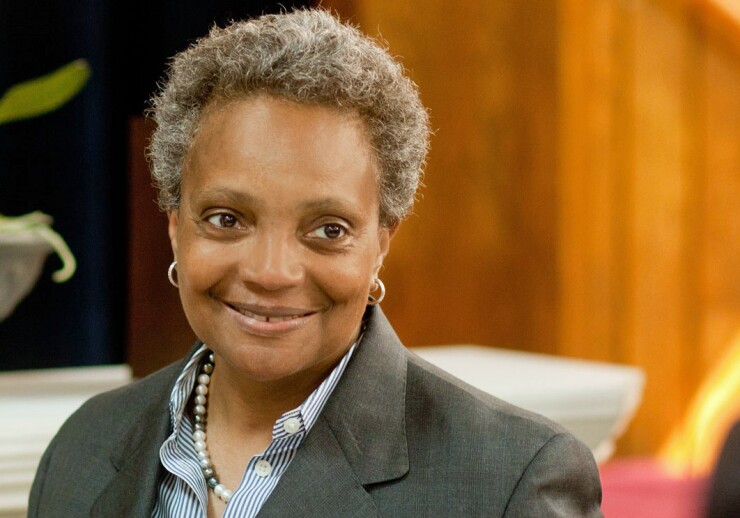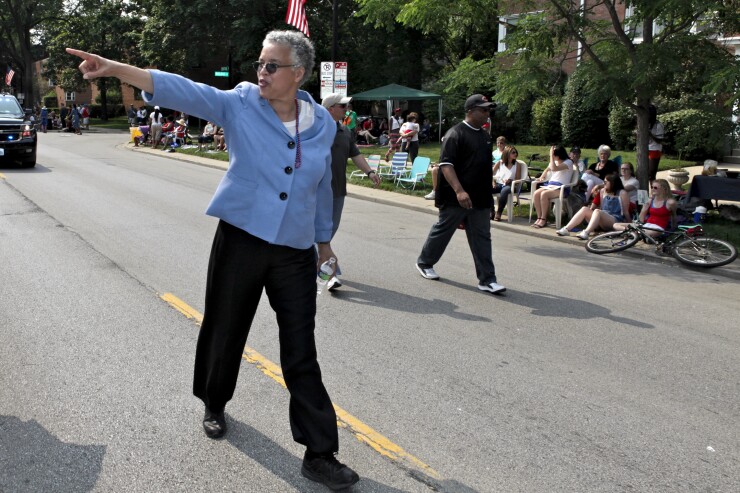CHICAGO — With 12 candidates eliminated from the Chicago mayor's race, the field has narrowed to two for the April 2 runoff that will shape the city's fiscal future.
Former Chicago Police Board head Lori Lightfoot, an attorney, will square off against Cook County Board President Toni Preckwinkle in a runoff that will influence the city's approach to its $28 billion of unfunded pension liabilities and low bond ratings amid warnings that more taxes could accelerate population losses.

Lightfoot, described as a blank slate for the municipal market, was the top vote-getter in the nonpartisan contest with about 17.5% of the vote. Preckwinkle, a familiar name as leader of the county, closely followed among a field of 14 candidates.
“This is a critical time for the city and the state with a brand-new governor and a brand-new mayor,” said Brian Battle, director of trading at Chicago-based Performance Trust Capital Partners. “I think what the market is most fearful is a lack of continuity on the fiscal responsibility” shown by the departing Rahm Emanuel.
“As Chicago loses a proven leader, the focus on his successor’s ability to concurrently handle the city’s issues — including the need for unprecedented financial discipline, escalating pension costs, continued pursuit of outside investment, challenges confronting Chicago Public Schools, grim crime statistics, and tax fatigue — will be intense,” John Humphrey, head of credit research at Gurtin Municipal Bond Management, wrote in a recent report.
During the campaign, neither Lightfoot nor Preckwinkle outlined clear fiscal fixes with the focus throughout much of the campaign on equitable neighborhood development, strategies on violent crime, police reforms, and in recent months on combating public corruption.
Preckwinkle, a former teacher and alderman and current head of the county Democratic Party, is well known to the municipal market. Lightfoot, a longtime corporate litigator who led the police board from 2015 to 2018 and a city task force on police reform, is not.
April's election will bring Chicago its first African-American female mayor. Lightfoot is also gay.
Both have portrayed themselves as progressives although Lightfoot has argued Preckwinkle long ago shed those roots as she rose through party ranks.
Lightfoot has never run for elective office and, unlike Preckwinkle and most of the other candidates, announced her campaign before Emanuel left the race.

Preckwinkle said during the campaign she has the better fiscal chops to deal with the city’s fiscal woes.
At first glimpse, the market may initially prefer Preckwinkle. As county board president she engineered a sales tax increase to funnel more money to pensions.
But records can cut both ways.
“The markets may feel more comfortable at the beginning with Toni Preckwinkle but they still have sort through all the issues,” said Triet Nguyen, a managing partner at Axios Advisors LLC.
Preckwinkle was endorsed by the teachers’ union and has strong labor support. That could signal an unwillingness to extract savings from labor. “She may be more bondholder friendly in the short term but maybe in the long term more detrimental to the city,” Nguyen said, if she favors raising taxes as “opposed to restructuring the spending side.”
The new mayor will hold sway over the city’s sister issuer agencies including the junk-rated Chicago Public Schools, the Chicago Park District, and the Chicago Transit Authority and must establish a relationship with new Gov. J.B. Prtizker. All three are Democrats.
Corruption surfaced as a central issue after federal prosecutors in December charged Alderman Edward Burke, then chairman of the finance committee, with attempted extortion for pressing a restaurant owner seeking renovation permits to use his private law firm for other business. The accusations hurt Preckwinkle and several other candidates in the race due to Burke ties.
“Hopefully as the media and public interact with both they will ask questions about fiscal responsibility,” Battle said.
Preckwinkle's Cook County government carries general obligation ratings that range from the single-A category to low-double-A compared to the city’s GO ratings with one in junk, two in triple-B territory and one at the single-A level. The city’s budget is $8.9 billion and the county’s is $5.94 billion.
“The market doesn’t know about Lori Lightfoot’s stance on fiscal issues so there may be a period of concern and it’s going to come down to what kind of financial team she surrounds herself with,” Nguyen said. “A blank slate could be better.”
On revenues, Lightfoot and Preckwinkle have said they support the city cashing in on a share of revenue from legalizing recreational cannabis and establishing sports betting if approved by the state.
Lightfoot does not support a property tax hike under the current tax system. Preckwinkle supports a tax on home sales valued at more than $1 million.
Lightfoot said in a recent public forum that the city will still need to “come up with progressive forms of revenue” to address near-term budget needs.
Emanuel will leave his successor with a proposal to issue $10 billion of pension obligation bonds. After Emanuel unveiled the proposal, Lightfoot issued a statement calling for "an independent analysis, substantive debate in City Council, and multiple public hearings" and since has said she opposed the borrowing as proposed as being too risky and said it could constrain future borrowing.
When asked during forums and interviews about the POBs, Preckwinkle has turned the conversation to her strides in dealing with county pensions and warned “there’s no silver bullet" and said she is generally opposed to issuing POBs before first exploring other options that "are more sustainable and less risky revenue sources that do not mortgage the city’s future earnings against a volatile equity market."
Neither support a push to ask voters to amend the state constitution to limit protections against cuts in in existing benefits.

Both candidates back moving to an elected school board from one whose members are appointed by the mayor. Some believe the current system means the mayor has skin in the game and is more willing to help, as evidenced by the city’s support for new pension and capital tax levies.
Nguyen disagrees. “I don’t think it matters either way,” he said, because the mayor would be expected to offer support under either form of management.
Market participants have praised Emanuel for bringing down the city’s structural deficit from more than $635 million when he took office in 2011 to about $98 million, raising taxes for pensions, and shedding scoop and toss debt restructuring.
People in the municipal market also credit Carole Brown, chief financial officer since 2015, with improved investor relations and instilling discipline on city fiscal management.
The most daunting pressure is coming up with a $280 million in 2020 to cover a hike in contributions to the police and fire funds when an actuarially based contribution hits under the mayor’s plan to bring the two funds to a 90% funded ratio by 2055. A $310 million spike hits in 2022 on the municipal and laborers funds to put them on track for 90% funding by 2058.
The city also faces a potential $252 million deficit heading in the next budget year.
The new mayor’s continued success in attracting big corporate headquarters to the city also is a point of concern among market participants as is balancing the need for tax increases without driving residents and businesses out.
The city remains the nation's third most populous but the number saw slight drops in 2015, 2016, and 2017.
The various tax hikes “have left residents with sticker shock, and the next mayor will confront increased tax fatigue as he or she looks to find revenues to ease the city’s financial strain,” Gurtin said.





